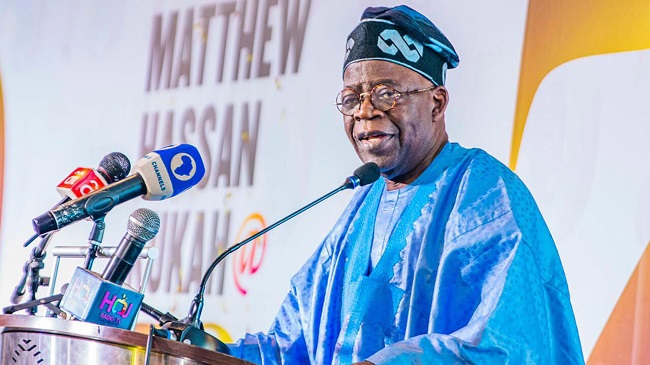

THE World Health Organisation (WHO) describes health financing as a core function of health systems that can enable progress towards Universal Health Coverage (UHC) by improving effective service coverage and financial protection.
In Nigeria, millions of people do not have access to healthcare services due to the cost. Many others receive poor quality of services even when they pay out-of-pocket. Health care in Nigeria is financed through different sources including tax revenue, out-of-pocket payments (OOPs), donor funding and health insurance (social and community).
Over many decades, achieving UHC, a successful health care financing system, continues to be a challenge in Nigeria. In April 2001, African Union countries met in Abuja, Nigeria, where they pledged to increase government funding for health by at least 15 percent. However, successive governments in Nigeria have missed the mark, while struggling to meet the adequate healthcare needs of citizens.

A [email protected] Scale assessment of the impact of developmental intervention by development Research and Projects Centre (dRPC) revealed that the average budget allocation to health sector was about 4.7 percent in two decades. It also showed that the budgets of the Federal Ministry of Health and its agencies between 2001 and 2021 showed that Nigeria neglected to follow through on its promise, oftentimes barely reaching a third of the pledged target.
Health capital less than expenditure
In 20 years, recurrent expenditure, also known as operational expenditure, represented 78 percent of the total health expenditure, and capital, 22 percent. Comparing the growth rate, recurrent expenditure has increased by 2,822 percent between 2001 and 2021, while capital has only increased over 400 percent.
This significant difference shows the government has prioritised human resource and office overheads while neglecting Nigeria’s dire need of health workers. Although Nigeria’s public spending on health has increased over the years, the nominal increase can be attributed to the increase in the general budget spending. However, the country is yet to attain the minimum requirement arrived at in the Abuja Declaration.

African Union leaders agreed to commit at least 15 percent of their spending on health. A look at Nigeria’s successive health budgets showed that they have been short of 15 percent of the total budgets. It was 5.3 percent in 2015 and dropped to 4.13 in 2016.

Between 2015 and 2021, 2018 recorded the least allocation of 3.95 percent; 2020, 4.08 percent and 2021, 4.03 percent of the total budget.
Some experts have attributed the poor funding of the sector to low earnings from oil revenues in the past vears as there are competing demands for limited resources, but knowing the relativity between a healthy population and increased productivity, health funding should be a priority.
In the years under review, budgetary allocation to the health sector, including alternative funding from the service-wide vote (contingency budget) and Nigeria’s Basic Health Care Provision Fund, never surpassed 7 percent.
The highest health budgetary allocation of 6.2 percent in 2012 is still far less than the 15 percent commitment in the Abuja Declaration. During COVID-19 pandemic, the country’s allocation to health for the 2021 fiscal year was 4.5 percent.
According to the National President and Project Director at the Medical Women’s Association of Nigeria (a [email protected] Scale partner), Dr. Minnie Oseji, low healthcare funding is a multifaceted problem with multisectoral solutions.
Oseji, however, noted that “supportive supervision” at every level of the government, as well as constant monitoring of specific targets and indicators, would help to effectively implement health care laws and policies, address challenges and foster coordination across agencies and states.
She also said innovative funding mechanisms, public-private partnerships and intramural practices could help meet the 15 percent target.
As of 2011, six countries had been able to meet and surpass the 15 percent target: Rwanda (23.8 percent), Liberia (18.9 percent), Malawi (18.5 percent), Zambia (16 percent), Togo (15.4 percent) and Madagascar (15.3 percent). Four countries are clearly on their way to meeting the Abuja target: Swaziland (14.9 percent), Ethiopia (14.6 percent), Lesotho (14.6 percent) and Djibouti (14.2 percent).
How Tinubu government can address healthcare financing in Nigeria
WHO has given some pointers on ways to address poor funding of the health sector in countries like Nigeria. It stated that these are carefully designed and implemented health financing policies that will help to improve abysmal healthcare funding issues.
The organisation said contracting and payment arrangements can incentivize care coordination and improved quality of care; while sufficient and timely disbursement of funds to providers can help to ensure adequate staffing and medicines to treat patients.
It stated that WHO’s approach to health financing focuses on core functions such as revenue raising (sources of funds, including government budgets, compulsory or voluntary prepaid insurance schemes, direct out-of-pocket payments by users, and external aid), pooling of funds (the accumulation of prepaid funds on behalf of some or all of the population) and purchasing of services (the payment or allocation of resources to health service providers).
WHO added that all countries should have policies which guide the population on which services they are entitled to.
Even if not explicitly stated by government, by extension, those services not covered are usually paid for by patients or made through co-payments.
How other countries finance healthcare
In Rwanda, the health sector budget increased from FRW282.3 billion in the 2020/21 revised budget to FRW377.1 billion in 2021/22, reflecting a nominal increase of 33.6 percent.
The health sector budget as a share of the total national budget increased from 8.1 percent over the same period.
Healthcare system in a country like Turkey consists of both public and private health services.
The Ministry of Health (MOH), universities, and the private sector provide healthcare services. Foreigners and expats living in Turkey can apply for health benefits in two ways; Universal Health Insurance and private health insurance.
While Universal Health Insurance in Turkey covers most health issues such as emergencies, pregnancy, and illnesses, the US healthcare system does not provide universal coverage and can be described as a mixed system, where publicly financed government medicare and medicaid health coverage coexist with privately financed (private health insurance plans) market coverage.
Out-of-pocket payments and market provision of coverage predominate as a means of financing and providing healthcare but as of 2019, around 50% of citizens received private insurance coverage through their employer (group insurance), 6% received private insurance through health insurance marketplaces (nongroup insurance), 20% of citizens relied on Medicaid, 14% on Medicare, and 1% on other public forms of insurance (eg, Veterans Health Administration [HA] and Military Health Service [MHS]), leaving 9 percent of Americans uninsured.
Federal spending on domestic and global health programmes and services accounted for 29% of net federal outlays in FY 2023. Mandatory spending comprises the majority (88% or $1.6 trillion) of federal spending on health programmes and services.
Why Tinubu must improve health funding
Tinubu is barely weeks into the presidency but the time to reinvigorate the health sector starts now. In his inaugural speech, he failed to mention the health sector, which sends a negative signal to health watchers.
More Nigerians are turning to alternative sources for healthcare because of the high cost of getting care in hospitals.
Many others who can afford to patronise the hospitals experience poor service delivery from undermotivated health workers.
Many of the patients end up having their medical conditions worsened, leading to absence from work, and loss of productive hours to their employers. In turn, the nation loses revenue due to low productivity at a time it is in dire need of more income.








